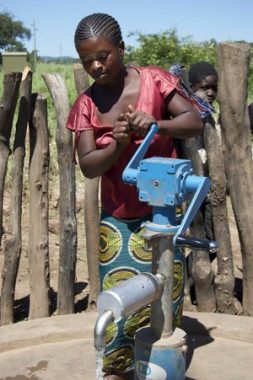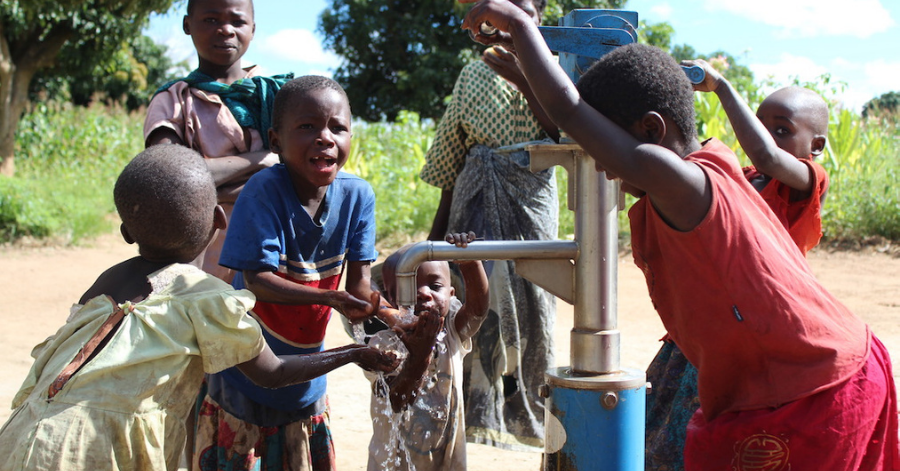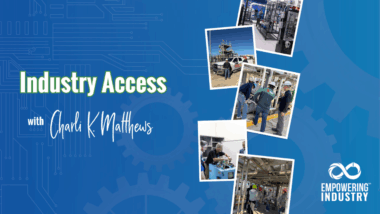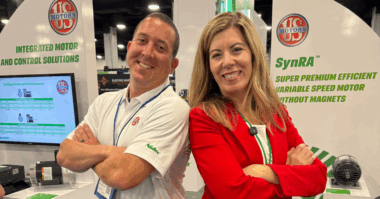For most of us, it is impossible to imagine a world where an overabundance of water is not accessible. We turn on the faucet and let the water run freely to brush our teeth or wash dishes. We don’t consider the effort required to get that same amount of water for people in rural communities throughout the globe.
In remote parts of the world, women spend several hours a day carrying heavy buckets many miles to gather water for their families. The work is backbreaking, and the water is filthy. Because of the effort and time required to collect the water, the children are unable to attend school or play.
More than 750 million people in the world do not have access to clean water. However, the non-profit engineering company, Design Outreach, has developed a deep-water hand pump called LifePumpTM that helps alleviate this crisis, especially in isolated communities.
Sam Lowry, a long-time friend, retired pump.engineer, and Rotary Club volunteer recently contacted me about supporting a Rotary Club campaign that would introduce this unique pump into Senegal under a pilot program to highlight the benefits of this new technology as a robust source of plentiful clean water for arid rural communities. The pilot project will start with five communities in Senegal, selected based on their critical water needs and the unique benefit of LifePumpTM for their location, climate, and hydrology.
According to Dwight Leeper, a fellow Rotarian volunteer working on the project, there are an estimated 80 million refugees globally. “They have fled violence, persecution, war, natural disaster, and climate change,” Leeper explains. “This crisis is causing increased social and political instability globally and locally. We in Rotary have a responsibility to make a difference however we can.”
Through the West Chester Rotary Club in Pennsylvania and the Dakar Soleil Rotary Club in Senegal, the project will provide deep water pumps to five communities in Senegal that would otherwise not have access to clean water. This project will build on the benefits and success of the ultra-deepwater hand pump LifePumpTM in Africa & Haiti.
About 15 years ago, Design Outreach founders Greg Bixler and Abe Wright had an idea of using their engineering expertise to help provide clean water to people in developing countries who had little or no access to it. Bixler visited Central Asia in 2007 and after seeing the extreme poverty up close, he realized he could help to alleviate some suffering in the world by using his engineering talents.
In 2010, Bixler and Wright co-founded Design Outreach, whose flagship product, the LifePump, is helping to solve the global water crisis by bringing the many benefits of reliable water to people across Africa and Haiti. Bixler’s endeavors have led him to more than 18 countries—all while serving as CEO of Design Outreach, resident director for the Ohio State University (OSU) service-learning program, and as an advisor for the OSU student chapter of Engineers Without Borders.
“There is a well-documented statistic that 90% of the world’s products are designed for only 10% of the world’s people,” Bixler said in a 2016 interview. “Engineers like myself spend all of our time designing things for just a sliver of the world’s population. That’s where humanitarian engineering comes in—to help fill that gap to design for people who are being overlooked.”
Design Outreach has now installed more than 50 LifePumps in nine countries—impacting more than 20,000 lives. The first LifePump was installed in Zolomondo, Malawi, in November 2013 and has been operating continuously with no downtime ever since.
With a reliable pump that is easily installed, easily operated, easily maintained, and can pump into extremely deep wells, the LifePump is certainly doing its part to help solve the world’s water crisis. Design Outreach is mostly volunteer based with many engineers, marketers, accountants, lawyers, and church groups who want to use their skills to contribute to a greater cause.
“We have so much abundance in America,” said Bixler. “It’s not that we should feel guilty of that abundance, but we can certainly use our wealth and abundance to help a lot of people in the world. It’s good for me to experience that. I’ve learned that draining my bank account is not going to solve the world’s problems, but inspiring other people to join me will make a huge difference. If we all do a little bit, we can get rid of a lot of these problems in the world.”
Bixler has seen first-hand how difficult it is to get water in some of these remote locations.
“These are real people, not just statistics,” Bixler said. “When we show up to install a LifePump, the people of the village are singing and dancing because they are so appreciative. Because they now have water, there is less disease, more food, schools are being built, and gardens are planted. Their lives are completely changed.”
Why the LifePump is the best hand pump solution for isolated rural communities
LifePumps vs. Current Hand Pumps*
- Able to go 3 times deeper (1.5 football fields)
- 30-year predicted life span
- 5-year maintenance cycle
- Easier to operate
- Degrades vs. fails
*(15% of water points are non-functional after one year and 25% after just four years of operation ) Ref: 1 Banks, B. & S. G. Furey (2016), “What’s Working, Where, and for How Long. A 2016 Water Point Update to the RWSN (2009) statistics” GWC/Skat, RWSN, St. Gallen, Switzerland.
Where can a LifePump help the most?
LifePumps provide a unique solution for rural communities with a population of approximately 250 to 1,000 individuals where :
- A standard hand pump won’t work because the water table is deeper than 45 meters
- They have a standard hand pump that fails during the dry season
- The existing supply of water is inadequate or contaminated
- Water is difficult or dangerous to obtain
The Dakar Club and L’OFOR of Senegal have selected five communities in dire need of a deep-water hand pump. Five life pumps will be shipped from Design Outreach in Ohio to Senegal.
The project will be accomplished in coordination with the non-profit Partners for World Health. Partners for World Health (PWH) is a non-profit 501(c)3 based in Portland, Maine. PWH collects medical supplies and equipment from healthcare facilities, manufacturers, other organizations, and individuals. We sort, evaluate, repackage, and prepare these supplies and equipment for distribution to individuals, communities, and healthcare facilities in need. PWH is already operating in Senegal and will help with logistics and WASH training. Local contractors will be trained in the installation and maintenance of the LifePumps. In addition, local water committees will be formed in each community for routine pump maintenance and water management. Education will be provided on water usage, sanitation, and hygiene (WASH). This training and use of local resources will ensure that the first five pumps, and those that follow, will be properly installed, maintained, and remain productive over the full 30 years of their design life.
In this video, you can hear impactful stories that show that women and children are spending their time to travel long distances to get water and that water is not fit for use. I have written about this before on Empowering Pumps & Equipment, and my heart goes out to communities that don’t have access to water when we have the technologies to allow them to dig deeper and pump the water that is just below traditional hand pumps.
I will continue to highlight the need for sharing these technologies with these communities, but this request is more urgent. Under this global grant, Rotary International (RI) will match private donations 50%. Combined with RI matching funds, a donation of $5,000 will cover the cost of a LifePump and benefit the lives of an entire rural community.
We know change happens when we invest in it. I am asking that companies and individuals in the pump industry come together and BUY PUMPS to SAVE LIVES.
Many in our network have reached out and expressed their interest in helping people who don’t have access to clean water. For years, I have been trying to get to Africa so I could see what was needed. I realize I don’t have to go there to understand what is needed. What is needed is better pumps and monitoring of those pumps so that these communities can live and thrive. Water is Life and the LifePump can provide life for so many in need.
Please support this campaign to Buy Pumps and Save Lives…
A $5,000 donation will cover the cost of a LifePump and benefit the lives of an entire rural community, but any amount would be very much appreciated and will help make the project a success!
If you would like make a donation in support of this humanitarian effort, please go to https://www.rotary.org/en/

Here are some resources to learn more:
Deep-Water Hand Pumps for Senegal Project Team
- The Dakar Soleil Rotary Club in Senegal is serving as the Host Club facebook.com/Rotarydakarsoleil
- The West Chester Rotary Club, USA is serving as the International Sponsor westchesterrotary.us
- Partners for World Health, who routinely provide medical supplies to Senegal, will project training and advice partnersforworldhealth.org
- The project will be coordinated with the Office of Rural Boreholes (L’OFOR) to keep them informed and solicit their advice forages-ruraux.sn
- LifePumps developed by the non-profit Design Outreach doutreach.org




